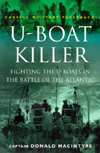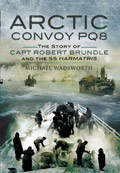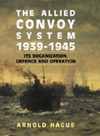U-Boat Killer
Macintyre, Donald
2000, Cassell Academic
ISBN 0304352357
179 pages, no photos
| Type. | Memoir/Personal Account |
| Pros. | First accurate restrained postwar personal account by a leading front-line figure. Clear narrative style and evocative description; humour, biography, and anecdotes add to events. A classless and revealing account. |
| Cons. | Unneccesarily critical of Coastal Command and the Royal Canadian Navy. Perhaps a little too soft and romantic compared to some accounts. |
| Rating. |  |
 Macintyre's 1956 account, republished in 1999, is still a singular and immensely valuable book. He was an unusual author in both his choice of career, and the content and approach of his book. There have been many other accounts of the Atlantic Campaign by officers since, (Monsarrat's 1972 autobiography, Gretton's Convoy Escort Commander, 1964, and Crisis Convoy, 1974, Whinney's 1986 U-Boat Peril - also recently republished by Cassell), but few have captured more than the grim reality of tiredness, poor equipment and training, and the relentless nature of the campaign. Macintyre wrote his personal account to correct the imbalances and inaccuracies of many existing factual and fictional accounts. Almost all accounts and popular memory held that the Battle of the Atlantic was a single crisis of shipping losses running ahead of construction, of open-boat survival voyages, of apocalyptically bad weather, and Allied technical and numerical impotence in the face of cruel and stoic German supermen working invisible and immune U-boats. Macintyre by contrast was "countermythical" in that he downplayed the sacrifices and losses of both merchant and Royal navies, revealing the haphazard nature of U-boat warfare as well as anti-submarine warfare. He also revealed the peaks and troughs of the campaign as seen by a participant, whereas standard accounts portrayed personal views as if global. The never-ending losses and defeats were only visible to strategists keeping track of entire campaigns, not singular convoy operations in sequence.
Macintyre's 1956 account, republished in 1999, is still a singular and immensely valuable book. He was an unusual author in both his choice of career, and the content and approach of his book. There have been many other accounts of the Atlantic Campaign by officers since, (Monsarrat's 1972 autobiography, Gretton's Convoy Escort Commander, 1964, and Crisis Convoy, 1974, Whinney's 1986 U-Boat Peril - also recently republished by Cassell), but few have captured more than the grim reality of tiredness, poor equipment and training, and the relentless nature of the campaign. Macintyre wrote his personal account to correct the imbalances and inaccuracies of many existing factual and fictional accounts. Almost all accounts and popular memory held that the Battle of the Atlantic was a single crisis of shipping losses running ahead of construction, of open-boat survival voyages, of apocalyptically bad weather, and Allied technical and numerical impotence in the face of cruel and stoic German supermen working invisible and immune U-boats. Macintyre by contrast was "countermythical" in that he downplayed the sacrifices and losses of both merchant and Royal navies, revealing the haphazard nature of U-boat warfare as well as anti-submarine warfare. He also revealed the peaks and troughs of the campaign as seen by a participant, whereas standard accounts portrayed personal views as if global. The never-ending losses and defeats were only visible to strategists keeping track of entire campaigns, not singular convoy operations in sequence.
Macintyre was a rarity in his choice of career. Most regular RN destroyer officers regarded ASW almost as the last refuge of the scoundrel. It was the place for those who had committed social indiscretions or made grave mistakes early in professional life. Cadets and midshipmen hoped and dreamed instead of the glamorous fleet destroyer, cruiser, intelligence, aviation and even construction career postings. Fortunately for the western powers, Macintyre, and a minority of other RN regulars such as Broome, Whinney, and Walker, took the opposite view. ASW offered more freedom, more chance to use initiative, more individuality, than the drudgery of capital ship escort or offensive patrolling, both obsolete command styles of the past. By 1943 those snobbish regular naval officers were clamouring to get into ASW; it was where the action was. Macintyre also spent a number of years as a naval aviator, something which gave him a more modern view than most gunnery-obsessed regulars, but which cut no ice later when describing what he saw as the shortcomings of some airborne ASW operations.
Those few regular officers with command and ASW experience such as Macintyre formed the vital solid core for the otherwise entirely Reserve and Volunteer officers who joined them in the ad hoc ASW force of Western Approaches Command. It was those poorly trained and equipped RNR & RNVR officers with Hostilities-only crews who bore most of the tremendous burden that the continually widening U-boat war placed upon the Allies. Macintyre was ringing in his praise of the often raw and unskilled landsmen who served under him. At every stage, in every new ship, he named his key junior officers and senior ratings, in a way that gave these otherwise anonymous and forgotten men faces and lives. Apart from Lockhart in The Cruel Sea, ASDIC officers and ratings are almost unseen in accounts of the campaign. Photographs of them are even rarer.
Class is a key element in British war books, though it is rarely overt. Humour is more common, indeed almost obligatory, as a way of demonstrating the gamesmanship of the English; their ability to cope, to keep the war at a distance. Upper-class captain authors like Peter Gretton referred to his officers (in traditional fashion) by the names of their ships, and went foxhunting when on leave. Macintyre by contrast called his officers and men by their names, described their distinctiveness, and their qualities, almost unique among histories and biographies. Macintyre went fishing, a much more proletarian, and revealing, pastime, than Gretton's foxhunting. His wife, however, was outraged to learn he was using hunks of steak as bait when Senior British Liaison officer at the US base at Argentia in Newfoundland! There are other humourous incidents both from his time in Newfoundland and elsewhere. One unintentional and surreal moment is from hunting a U-boat late in the campaign, after Macintyre had captured the skipper of U-99. It has a Spike Milliganish quality, as Macintyre wrote "Suddenly, through Otto Kretschmer's binoculars, I saw ahead of me the conning tower of a submarine."
The book has only a few photographs, not surprisingly for a title from 1956, when such works were not lavishly illustrated. The demand for more images with text was in later decades. Even these, however, tend toward the individual and unique. They include Macintyre and his officers, and his ships - HMS Hesperus bent-stemmed after ramming a U-boat, entering the famous Gladstone Dock, Bootle, Liverpool; a place more familiar from scenes of Walker's sloops after the "Six-in-one-trip" cruise of January-February 1944. There is an evocative, smoky aerial view of Macintyre's later command the frigate HMS Bickerton, shortly before she sank, stern blown off by an acoustic torpedo. Together with the style, content, and approach, they form a more than unusual mix for such a pedestrian, formulaic genre as Atlantic Campaign officer's memoirs.
The author welcomes your comments on this review.
Review written by Ian Campbell, Launceston, Tasmania.
Published on 20 Sep 2001.
This title is highly recommended.
Purchase information: (info) Get U-Boat Killer now at amazon.co.uk
Get U-Boat Killer now at amazon.co.uk
Return to our main review page.



